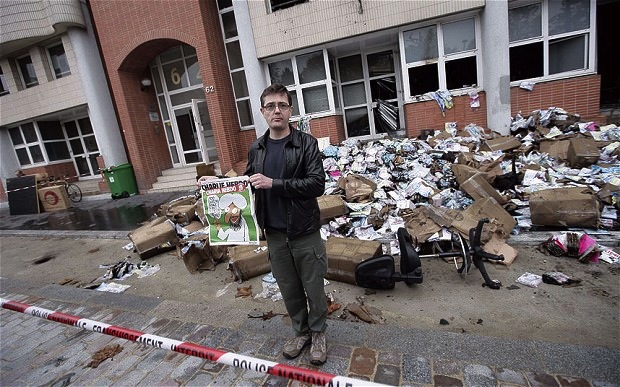France Considers Wider Snooper State Powers to Watch Hostile Muslims
05/05/2015
France’s lower house has passed a bill to expand the surveillance capacity of the government, and the legislation is headed for the French senate. French civil libertarians oppose the measure as a government invasion of privacy.
The legislation is a reaction to January’s Charlie Hebdo massacre, where two jihad gunmen invaded the Paris magazine’s office and executed 11 journalists, artists and others in the building.
Below, the office of Charlie Hebdo was firebombed in 2011 for the magazine’s satires of Mohammed, but editor Stephane Charbonnier (“Charb”) refused to stop publishing despite the attack. He was murdered on January 7, 2015, by jihadist gangsters.

The millions of Muslim residents in France pose a danger to public safety and national security, so the imported enemy within requires extra attention. A country cannot indulge in extreme diversity that includes historic enemies and still maintain a high level of freedom from government intrusion.
Another sign of France’s wobbly level of public safety: 7000 soldiers are to be permanently deployed to the nation’s streets. They were put on security duty following the January terrorism and now the policy is being made permanent to maintain the peace, if such a thing is possible in diverse France these days.
The government should start with legislation to end immigration from Islamic nations. That would be the most effective measure to take, albeit late in the game for France, which is far down the road of suicide by immigration.
France passes new surveillance law in wake of Charlie Hebdo attack, The Guardian, May 5, 2015Controversial new bill that allows intelligence agencies to tap phones and emails without judicial permission sparks protests from civil liberties groups
The French parliament has overwhelmingly approved sweeping new surveillance powers in the wake of the terrorist attacks in Paris that killed 17 people at the satirical magazine Charlie Hebdo and a kosher grocery in Paris.
The new bill, which allows intelligence agencies to tap phones and emails without seeking permission from a judge, had sparked protests from rights groups who claimed it would legalise highly intrusive surveillance methods without guarantees for individual freedom and privacy.
Protesters for civil liberties groups had launched a last-ditch campaign against the bill under the banner “24 hours before 1984” in reference to George Orwell’s dystopian novel about life under an all-knowing dictatorship. Groups including Amnesty International had warned of “extremely large and intrusive powers” without judicial controls.
But despite opposition from green and hard-left MPs, the bill won the overwhelming backing of the majority of MPs from the Socialist and rightwing UMP parties, which said it was necessary to tackle the terrorist risk. The bill was passed in the national assembly by 438 votes to 86, with a handful of no votes from Socialist MPs.
As it stands, the new law will allow authorities to spy on the digital and mobile phone communications of anyone linked to a “terrorist” inquiry without prior authorisation from a judge, and forces internet service providers and phone companies to give up data upon request.
Intelligence services will have the right to place cameras and recording devices in private homes and install so-called keylogger devices that record every key stroke on a targeted computer in real time. The authorities will be able to keep recordings for a month, and metadata for five years.
One of the most contentious elements of the bill is that it allows intelligence services to vacuum up metadata, which would then be subject to analysis for potentially suspicious behaviour. The metadata would be anonymous, but intelligence agents could follow up with a request to an independent panel for deeper surveillance that could yield the identity of users.
Another controversial element is the so-called “black boxes” — or complex algorithms — that internet providers will be forced to install to flag up a succession of suspect behavioural patterns online, such as what keywords a user types, what sites they consult and whom they contact and when.
Surveillance agencies will also be able to bug suspects’ homes with microphones and cameras and add keyloggers to their computers to track every keystroke.
The French prime minister, Manuel Valls, had defended the bill as “necessary and proportionate”, saying that to compare it to the mass surveillance “Patriot Act” introduced in the United States after the 9/11 attacks was a lie.
He has said that the previous French law on wiretapping dated back to 1991, “when there were no mobile phones or internet,” and the new bill was crucial in the face of extremist threats.
Pierre-Olivier Sur, chairman of the Paris bar lawyers’ association, warned this week that the bill was “a serious threat to public liberties”, and would put French people under “general surveillance”.
France is monitoring an estimated 1,200 Islamists and about 200 people who have returned from fighting with militant groups in Syria and Iraq. It has earmarked about €425m (£300m) to recruit thousands of extra police, spies and investigators to beef up surveillance and boost national security and intelligence.
The interior minister, Bernard Cazeneuve, told Libération last month: “The measures proposed are not aimed at installing generalised surveillance. On the contrary, it aims to target people who we need to monitor to protect the French people.”
The president, François Hollande, has taken the rare step of promising to refer the law to the Constitutional Council, the country’s highest authority on the constitution, to ensure its principles are lawful.
The law will now be examined by the Senate.
